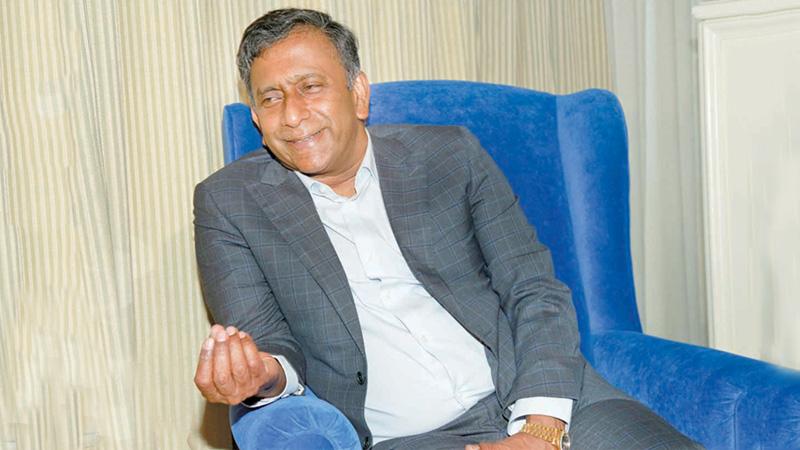
World renowned liver specialist from Chennai, India and Chairman, Dr Rela Institute and Medical Centre Hospital, Prof Mohamed Rela was in town to establish a Colombo office and interact with patients treated by his institute.
 Prof Rela, who holds a Guinness World Record for performing a liver transplant on a five-day-old baby, is proud of his over 100 surgeries on Sri Lankans. He is regarded as the busiest liver transplant surgeon in the world by the World Health Organization. The Sunday Observer sat down with him to uncover his journey and career.
Prof Rela, who holds a Guinness World Record for performing a liver transplant on a five-day-old baby, is proud of his over 100 surgeries on Sri Lankans. He is regarded as the busiest liver transplant surgeon in the world by the World Health Organization. The Sunday Observer sat down with him to uncover his journey and career.
Q. What is your mission in Sri Lanka?
A. We have been having an association on Liver Disease and Transplant with doctors and patients in Sri Lanka for the last 10 years. We have just completed our 100 transplant on a Sri Lankan patient who come to Chennai for the service.
It is really a celebration - to open the local information centre, to gather doctors and patients so that they can communicate with each other, to see how well transplantees are doing and for them to interact with each other. Because we feel, it is important to have periodical patient gatherings with us. If a patient had a transplant six-months ago, he doesn’t know how things are going to be in five or ten years’ time. When he meets patients from different time periods, it gives them a good feeling, that they are also likely to have a good life later. Yes, it is a celebration.
Q. You spoke of hundred surgeries. What were the challenges and benefits you’ve earned doing them?
A. The expertise is at an international level for patients and at a national level for doctors. For us, it’s an experience to offer services to a country that’s close to us. It is a lifesaving operation for patients suffering from liver disease. It gives them prospects for a healthy and quality life.
A liver transplant should benefit a patient for 20, 30, or even 40 years. For us it is about improving local expertise and dealing with local issues pertaining to the local population.There are many metabolic diseases and nutrition-related diseases. Fatty liver is very common among the population in South Asia because of their diet. Sri Lanka also does liver transplants, even though it’s small in number.
Q. Medicine is lifesaving and service-oriented. What is your take?
A. I don’t want to glorify myself. I’ve been brought up in this profession and graduated in 1982. So it’s almost 36-years working in the industry. Particularly, when you go in to my interest of surgery, I would have seen it as an anatomy, as a science endeavour. Sometimes, when you’re working on very complex patients, you’re working inside connecting up, finding blood vessels and working under a microscope you see it as a huge scientific experience.
Sometimes, you forget there is a patient in there. When you see it transform life, after sometime, it gives you a great feeling. I have done a transplant on a five-day-old child, the youngest to have a liver transplant.
The child’s name is in the Guinness Book of World Records and so is mine. You see these children grow. When you operate on a six or three-month-old child, when the child comes back to see you, you can’t recognise him.
So it is when the child is 12-years-old. Whereas, when you treat adults and when you see them back, you see them as adults. They may be aged a little bit over the years. That is what that is so beautiful about this. They have transformed and that is very gratifying. Sometimes, you recognise the children by recognising their parents. Not the child.
Q. Where does SL stand, on this subject?
A. We worked very closely with doctors who are happy with their association with us. So were we. Liver transplant has been in existence for almost 40 years, more so in South Asia. In the last 10 years, there has been huge progress made. In the last 20 years Japan and Korea have made huge progress, in living donor transplants. Sri Lankan doctors are extremely talented, there is no doubt about it.
Q. How does one develop liver illness?
A.There are hundreds of causes. The most-popularly known is obviously alcohol. Everybody thinks if you drink a lot of alcohol you get liver sickness. That is true. It’s however not the main cause.
It can even come in children. Children can be born with liver disease and developmental problems. Some problems can cause liver disease immediately after birth.There is a high proportion of children needing transplants in this country.
Of the 100 we did, 48 were children. For adults, one of the common sicknesses that can be classified is viral hepatitis (Hepatitis B, C). The ‘B’ might be coming down, but still is quite common. These viral infections can also cause liver cancer in the long term. Only 10-15% are due to alcohol.
Q. What is your message to Sri Lanka on liver transplants?
A. It’s an expensive, highly technical operation. It requires a large group professionals to work together - surgeons, herpetologists and high quality nurses.
It requires very special facilities. It’s happening now in the country and with time will become popular.
If it is to be available to all, then the government and NGO’s have to intervene and help. It’s a major health issue that the government can only solve, because the funding has to come from there. SL is going through a phase; it is going to be successful.
